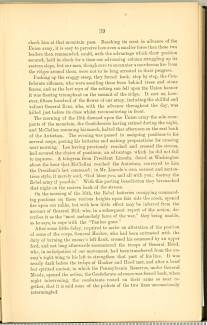Collection Name
About
check him at that mountain pass. Reaching its crest in advance of the Union army, it is easy to perceive how even a smaller force than these two leaders then commanded, could, with the advantage which their position secured, hold in check for a time our advancing column struggling up its eastern slope, but our men, though sure to encounter a murderous fire from the ridges around them, were not to be long arrested in their progress.
Pushing up the craggy steep, they forced back, step by step, the Confederate riflemen, who were assailing them from behind trees and stone fences, and as the last rays of the setting sun fell upon the Union banner it was floating triumphant on the summit of the ridge. It cost us, however, fifteen hundred of the flower of our army, including the skillful and valiant General Reno, who, with the advance throughout the day, was killed just before its close whilst reconnoitering in front.
The morning of the 15th dawned upon the Union army the sole occupants of the mountain, the Confederates having retired during the night, and McClellan resuming his march, halted that afternoon on the east bank of the Antietam. The evening was passed in assigning positions to his several corps, posting his batteries and making preparations for crossing next morning. Lee having previously reached and crossed the stream had secured the choice of positions, an advantage which he did not fail to improve. A telegram from President Lincoln, dated at Washington about the hour that McClellan reached the Antietam, conveyed to him the President's last command; in Mr. Lincoln's own earnest and sententious style, it merely said, "God bless you, and all with you; destroy the Rebel army if possible." With this parting benediction they bivouacked that night on the eastern bank of the stream.
On the morning of the 16th, the Rebel batteries occupying commanding positions on these various heights upon this side the creek, opened fire upon our ranks, but with how little effect may be inferred from the account of General Hill, who, in a subsequent report of the action, describes it as the "most melancholy farce of the war," they being unable, as he says, to cope with the "Yankee guns."
After some little delay, required to make an alteration of the position of some of the corps, General Hooker, who had been entrusted with the duty of turning the enemy's left flank, crossed his command by an upper ford, and not long afterwards encountered the troops of General Hood, who, in anticipation of our movement, had been transferred from the enemy's right wing to his left to strengthen that part of his line. It was nearly dark before the troops of Hooker and Hood met, and after a brief but spirited contest, in which the Pennsylvania Reserves, under General Meade, opened the action, the Confederate advance was forced back, when night intervening, the combatants rested on their arms so near together, that it is said some of the pickets of the two lines unconsciously intermingled.
